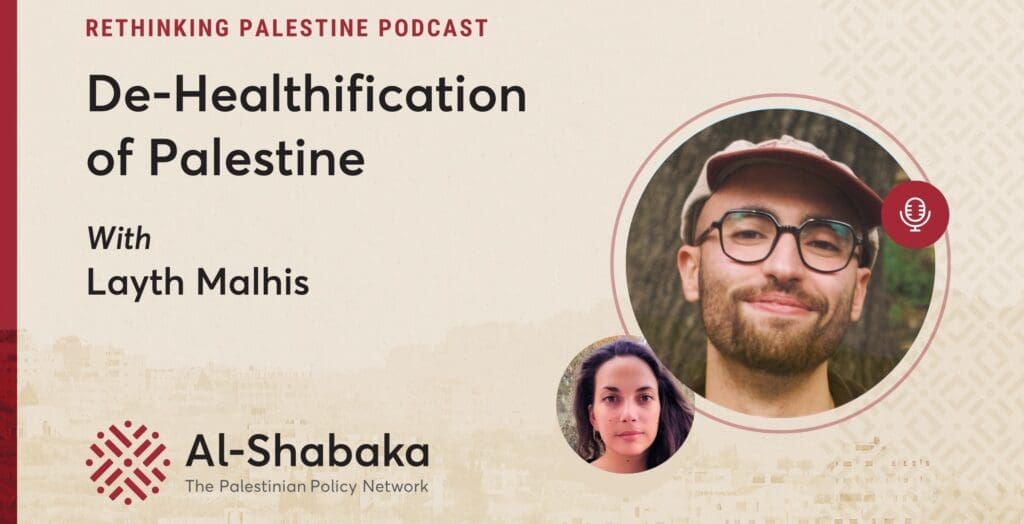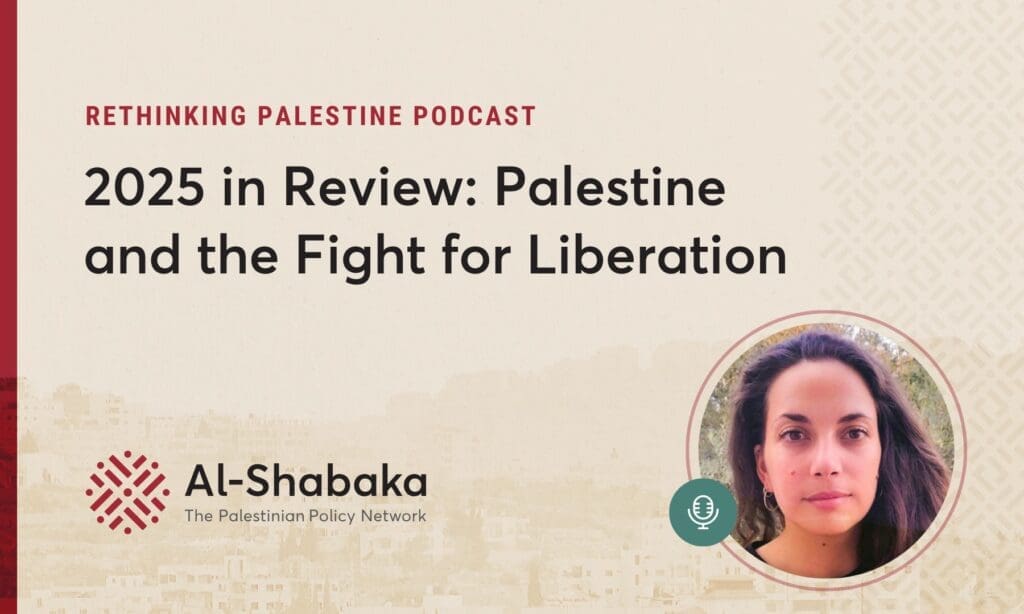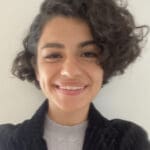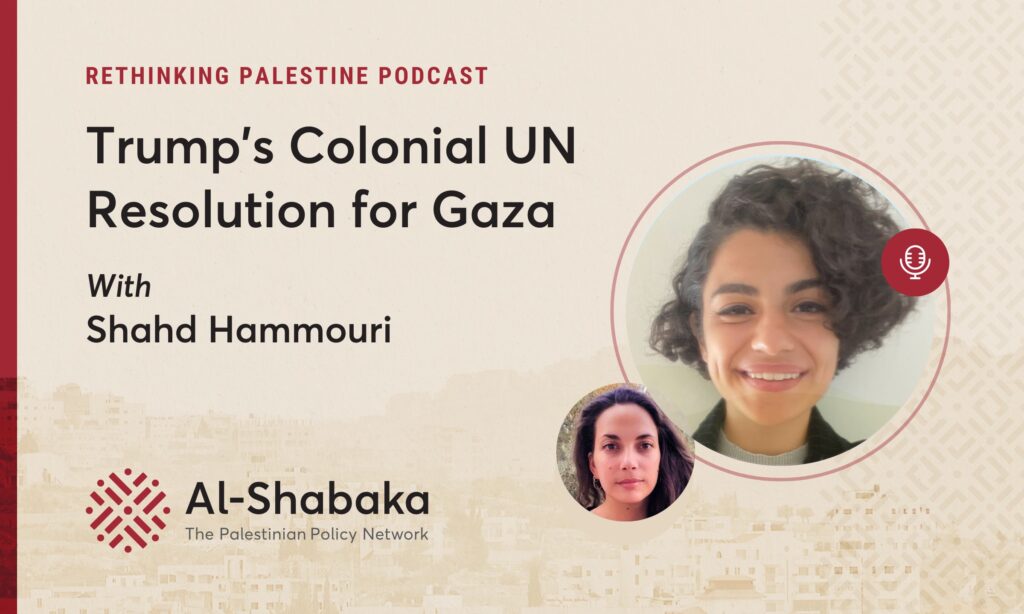About This Episode
Episode Transcript
The transcript below has been lightly edited for brevity and clarity.
Marwa Fatafta 00:00
I, however, would not give the sole credit to those outlets, but rather to young and intelligent Palestinian journalists, analysts, and activists who are able to reflect and describe the Palestinian struggle eloquently and unapologetically, as well as the power to refuse being ambushed by Western TV journalists or presenters asking questions in bad faith or out of ignorance.
Yara Hawari 00:33
This is Rethinking Palestine, a podcast from Al-Shabaka: The Palestinian Policy Network, a virtual think tank that aims to foster public debate on Palestinian human rights and self-determination. We draw upon the vast knowledge and experience of the Palestinian people, whether in Palestine or in exile, to put forward strong and diverse Palestinian policy voices. In this podcast, we will be bringing these voices to you, so that you can listen to Palestinians sharing their analysis, wherever you are in the world.
Over this last month, we have been witnessing a Palestinian uprising, which is being dubbed by some as the Intifada of Unity, because of the mobilization of Palestinians across colonized Palestine. This has seen Palestinians demonstrate, protest, and resist settler colonialism across various geographies in a variety of ways – from Sheikh Jarrah, where we saw the mobilization of mostly young Palestinian activists heed the call to save and protect the neighborhood, to Haifa, where Palestinians in the hundreds hit the streets to protest. These protests and confrontations with the Israeli army and police have not been the only feature of the uprising. We also saw a nationwide strike on the 18th of May, which had massive participation from Palestinians all over, as well as by those in solidarity.
Now, of course, during this time, Israel also started a bombardment campaign of Gaza for about 10 days. Over 250 people were killed by the Israeli army, including 66 children. Not only were Palestinians massacred, but vital infrastructure was destroyed, including the main road to the main hospital, the only COVID testing clinic, residential buildings and much more.
Now, as expected during this time, we have been seeing huge international media coverage of the events. And in this media coverage, we saw different non-official Palestinian voices hitting mainstream outlets in ways that, I think, we’ve never seen before. So to talk about this international media coverage and media discourse in general on Palestine, I’m joined by Al-Shabaka analyst Marwa Fatafta, who also works on digital rights in the Middle East and North Africa.
Marwa, thank you so much for joining.
Marwa Fatafta 02:47
Thank you, Yara, for hosting me.
Yara Hawari 02:49
Marwa, can you talk to me a little bit about what you’ve been seeing during this latest media coverage on Palestine, and if you think things are different this time around?
Marwa Fatafta 02:59
I think it would not be an overstatement to say that what we have witnessed during the past few weeks is a narrative breakthrough. For decades, Palestinians have been dehumanized through and through in international media: the way they’re suffering under Israel’s brutal occupation has been negated or dismissed, how they are vilified as terrorists or instigators of violence whilst the colonizer and the occupier is portrayed as the victim, and also in the way Palestinian life has always been relegated to a lower status, justified by Israel’s right to defend itself.
This time, however, we see Palestinian voices being centered more prominently. Palestinians were given airtime on American and international TV stations. I, however, would not give the sole credit to those outlets, but rather to young and intelligent Palestinian journalists, analysts, and activists who are able to reflect and describe the Palestinian struggle eloquently and unapologetically, as well as the power to refuse being ambushed by Western TV journalists or presenters asking questions in bad faith or out of ignorance. Mohammed El-Kurd from Sheikh Jarrah was such a powerful and refreshing voice, telling the truth as it is, unfettered and uncensored.
Some of the media highlights, for me, were John Oliver’s segment on Israel’s war on Gaza, where he killed the unremitting myth of “both sides,” propagated by the international community. That segment was a sign that the walls of traditional media are starting to crack, and the reality of Palestinians is coming to the so-called “mainstream media.” Another example that comes to mind is the New York Times front page coverage of the 62 Palestinian children killed in Gaza during Israel’s airstrikes, which is really a first.
This being said, I think we should not be delusional that those examples are the exception and not the rule. International media houses continue to cover the violence on the ground without contextualizing it, bringing the unarmed occupied people to an equal footing with the occupier – which, as you know, is one of the most powerful military powers in the world. At the same time, as more accurate terms describing the reality of Palestinians – the reality of apartheid settler colonialism – started to make it into mainstream lexicon, we saw and read leaks of editorial instructions being circulated to journalists and media personnel banning the use of such words, under the pretext of partial report.
Yara Hawari 05:48
Marwa, you are someone that engages with the mainstream media and also with social media, with regards to Palestine. So I was hoping that perhaps you could tell us about your personal experience with the media.
Marwa Fatafta 06:02
Sure. I have been very active on social media, and on Twitter primarily, during the past few weeks. And so I received a lot of press requests, many of which I gladly passed on to Palestinian activists and journalists on the front lines, because I think it’s extremely important to center their voices in Jerusalem, in the West Bank, Gaza, and so on.
On the other hand, as you know, I’ve been working and covering the online censorship that happens on social media, and I think we successfully managed to mobilize international media outlets to cover the issue. The story of content moderation bias and discrimination was covered by a major international outlets, especially those interested in technology and social media, and it was really refreshing to see them interviewing Palestinian experts on the issue, rather than the usual white male experts. And the pressure seems to be working. Tech companies have been scrutinized for their censorship and digital repression, so that’s definitely a win for the short-term.
Yara Hawari 07:17
Yeah, Marwa, we did see a lot of different Palestinian voices hit mainstream media. And I think that was something that has been unprecedented. Usually the Palestinians that are given those platforms are officials, Palestinian Authority figures, and so this was really, in a way, quite refreshing to see younger voices. But of course, you know, we have to be very honest that many of these voices also in themselves are not particularly representative of the Palestinian people. The media likes to hear Palestinians who speak English with American or British or European-friendly accents, and I think that is important to note – that media still remains inherently bias to the majority of Palestinians.
Marwa Fatafta 08:10
That’s definitely true. At the same time, I think maybe one of the blessings that came out of our own catastrophe is the fact that we have Palestinians everywhere, speaking different languages, coming from different education and occupational backgrounds. And we can see that, wherever you turn the TV on, or wherever you go on on streets here in Europe, you’ll see Palestinians – younger generations of Palestinians – being vocal. And what has been extremely refreshing to see, for me, was the fact that they are unapologetic about their existence, and about the way they express their reality, and the way that they refuse to compromise on how they narrate their own stories, as opposed to Palestinian officials or others who are keen to show Palestinians in a certain light that would deem them worthy of sympathy and solidarity. I think none of that is in the recent press coverage we’ve seen, in my opinion, and that’s definitely a new thing in this round.
Yara Hawari 09:23
So I want to turn now a little bit to language. I think language is more important than people realize. It has the power to justify all kinds of violence, and as Palestinians, we see how this is done time and time again by the Israeli regime and how the international media really adopts this language. There’s a whole lexicon, in fact, of words and phrases. The most common is the phrase, ” the Israeli-Palestinian conflict,” which implies this disagreement between two parties or two equal sides that both have valid grievances, which of course obscures the fact that this is a colonial occupation, and the solution is to end the colonial occupation, not to have two sides sitting down and having this tête-à-tête. Other words we’ve seen used a lot are “clashes” rather than “resistance to settler colonialism or military occupation,” or the use of even the “Israeli Defense Force,” which actually is something that many of us use, many Palestinians use, and this, unfortunately, buys totally into the Israeli narrative that it is defending itself from outside forces bent on its destruction, rather than an occupation army that is guilty of war crimes.
And speaking of war crimes, the reporting on Gaza was and continues to be awful. Often we find in the media – and this was very much the case during the latest assault – that Palestinians die and Israelis are killed. So basically, for Palestinians, their deaths are always passive. The responsibility is always removed from the aggressor. It’s as if Palestinians were inherently born to die. And it reminds me very much of Judith Butler’s frames of war, in which she questions whose lives are grievable, and that if you frame a people or a place as this perpetual war zone, then their lives become less grievable. They become less valuable. And, Marwa, you mentioned the New York Times article in which, on their front page, they showed the pictures of all the Palestinian children that were killed in Gaza. And a lot of critics said that it’s easier to talk about killed Palestinian children and to frame them as innocent than Palestinian adults. And the question is, are Palestinian adults – particularly men in this case – are they not innocent? Are their lives not, not grievable?
And so, even though we’ve seen a narrative shift, and we’ve seen this increased presence of Palestinians, I still think that this epistemic violence, which inherently allows for actual material violence, is still incredibly prevalent.
Marwa Fatafta 12:14
Yes, and I think this kind of portrayal of Palestinians is racist. It’s a form of racism. And it brings to mind, also, visual images from motion pictures, wherein whenever you are filming or portraying the Middle East, you always have this yellow screen of a war zone. And I think that’s a form of racism.
But to the New York Times article, for grounding the killing of Palestinian women and children to assert the value of Palestinian life, or even worse Palestinians’ victimhood, and therefore their eligibility to life and dignity, is in and of itself an act of dehumanization. Every Palestinian life is sacred, and we do not need to be victims so we can claim our right to dignity and self-determination on our lands. And this logic goes in tandem with the Palestinian leadership’s pursuit of a failed peace process, which at some level, seeks to prove to the international community that we are a peace-loving people, willing to sit down and negotiate with Israel, who always claims that they lack a peace partner, and that we’re happy to play by the playbook, so we can finally get the world to support us and listen to our demands. And, as I mentioned before, the new generation of Palestinian activists are aware of this pitfall, thankfully.
Yara Hawari 13:48
If you’re enjoying this podcast, please visit our website, www.al-shabaka.org, where you will find more Palestinian policy analysis, and where you can join our mailing list and donate to support our work.
Marwa, your work also focuses on digital rights and social media. So perhaps you can talk to us a little bit about how social media has actually impacted this shifting narrative in the mainstream media, especially in the recent weeks.
Marwa Fatafta 14:19
I think social media has helped tremendously in this shift in narrative and also the ability for the world to see with its own eyes the reality of Palestinians and Israel’s violence and oppression for what it is. In a world where Israel and its lobby arm have a sort of monopoly over the narrative, and where international media outlets have previously played the role of gatekeepers in deciding what makes the headlines, bringing in distorted or sanitized or watered down versions of the truth under the pretext of impartial or objective reporting, social media broke this barrier. It also gave media outlets little room for maneuver in their coverage.
One example that comes to mind is the video of the Israeli settler in Jerusalem driving his car into a crowd of Palestinians sitting on the side of the road, with of course the intent to kill them. But, I think it was either Reuters or AP, I can’t member, had a ridiculous coverage of the story. There was a headline that reads something like, “Palestinians throw stones at an Israeli settler,” with a picture of him with blood falling down on his face. But thankfully, because we’re able to see those images and videos without those distorted headlines, we were quick to call out those outlets and even correct their coverage.
I also think that public figures and celebrities speaking up in solidarity with Palestinians helped. Celebrities won’t liberate Palestine, and we should be careful not to over celebrate or rely on this momentum politics, but we should understand their importance in the context of bringing visibility to the Palestinian struggle and empowering others who have probably less visibility and or clout to speak up. So, in a way, feeling part of a collective or seeing others speak up encourages other people and more people to do the same.
And, despite of the attempts at censorship and digital repression that we’ve seen the past few weeks, I think we’ve certainly reached a new level in public awareness. Before the 6th of May, I believe, words such as apartheid, settler colonialism, weren’t as common as now. I think people, because of social media and the mass outreach, can finally understand the reality of Palestinians, the reality of apartheid, reality of settler colonialism, the fallacy of this “both side-ness.” And that’s extremely important, thanks to of course Palestinian voices, and their ability to use, social media to support their own struggle and build solidarity with others.
Yara Hawari 17:17
Now of course at Al-Shabaka we’ve produced a lot of materials about how social media also can be antithetical to revolution, and we actually have a podcast about the dangers of social media when it comes to activism and the repression. But I guess if we’re to talk about something that’s been positive over the last few weeks with regards to social media, it has allowed Palestinians to engage in citizen reporting, to stream live from their lived reality, to stream live horrific, brutal repression happening in that moment. And we saw this particularly with Sheikh Jarrah, where various young people from the neighborhoods were really filming their everyday reality, which is horrific to see, and they made it accessible to hundreds of thousands of people around the world. People could just open their phone, open Instagram, and see these stories of what was happening in real time. And so I think it’s become a source of information that’s totally accessible in ways that mainstream media isn’t, and it’s also personalized the Palestinian experience. People can now put faces to what that repression looks like.
And of course, this comes with also a whole host of dangers of personalizing or personifying a liberation struggle. It also comes with very nasty repercussions for the people who are posting on social media. The immense mental toll it takes on people, I think, is something that we’ll be dealing with for years to come – the trauma that comes with trolling, the pressure that comes with having to keep followers updated – and I think that’s something that we will slowly have to unpick. I want to go back to talking about this shift in narrative, and to be very careful that, as you have said, Marwa, that we shouldn’t also overstate it. We should celebrate it cautiously, because the reality is that we also need action and material impact.
And we have to also be clear that there are consequences that are faced by those who are deeply active in the narrative shift. On the ground, across colonized Palestine, activists are being arrested by both the Israelis and the Palestinian Authority – although we should be clear that most of those being arrested are young working-class men, who don’t have the same access to support and material privileges as many of those who are speaking to the media. But the backlash also happens abroad, where people engaged in the narrative shift are losing jobs for speaking up on Palestine. So, my next question is twofold: Is it worth investing so much in this narrative shift in a media that is inherently antithetical to Palestinian revolution? And, if yes, how do we transform this narrative shift into action, or how do we use it to our benefit so that we can see real material transformations on the ground?
Marwa Fatafta 20:39
That’s an excellent question, and I think these two tactics should not be mutually exclusive. We should continue to speak up about Palestine, but also we should aim to sustain it and build on it. Now, when the cameras turn off and the world’s eyes turn to other events, the cold violence of the Israeli occupation continues, the ethnic cleansing continues, the acceleration of Israeli settlement building, the military occupation, the checkpoints, the discrimination, the inhumane siege on Gaza, the strangling of Palestinian communities on both sides of the Green Line, the incarceration, the denial of the most basic of rights in every aspect of life, including access to health and education. During the last events, I totally forgot that there’s actually an ongoing, deadly pandemic. None of this stops. And so, while people should continue to speak up and speak about Palestine and mobilize on the internet, we need to mobilize on the ground, with collective community action.
The General Strike for Dignity, which took place on the 18th of May, was a powerful demonstration of Palestinian unity and agency and dignity, and that tactic is important. I think it’s incumbent upon us to maintain and protect this kind of evoked sense of unity and hope as a people, especially following decades of despair and acquiescence brought upon us by the Oslo paradigm and its leadership. Let’s also not forget that Israel’s impunity sustains itself by intimidating Palestinians and their allies who speak up into silence through blatant accusations of antisemitism. They already started with the witch hunt, and I suspect that this purge will continue. Therefore, it’s important to find and forge communities of support and solidarity among Palestinians, but also with our allies, to continue empowering each other and to provide both emotional, social, but also financial, material, and legal support, which is important. Speaking truth to power can be a costly act, and even sometimes a lonely one, but it shouldn’t be so. It’s really heartwarming and assuring to see that Palestinians are now forming committees, for example, to support and protect each other amidst Israel’s campaign of mass arrests in 1948. And these popular committees remind me of the spirit of the First Intifada, which continues to be, at least for me personally, one of the most inspiring historical moments of the Palestinian people’s struggle, and it can bring us a wealth of lessons and tactics, which we can use to move forward.
But also what you mentioned, Yara, around the hazards and the threats being brought to us with this narrative change and finding a voice on social media, to me, that brings this story of the Arab Spring back again. With all of the conversations around digital activism, and where do we move from there into actual impact on the ground, it’s important to remember a simple lesson from that historical event as well – which is that digital activism alone does not lead to real social or political change unless paired with actual political organizing and mobilization on the ground. The change in narrative is important, but that’s not the end goal. And social media has enabled us – despite of the censorship, despite of the surveillance, despite of the crackdown – it has enabled Palestinians to narrate the idea that Edward Said had mentioned: That we have been denied the permission to narrate, but social media has brought us this kind of breathing space, where we can, for once, narrate our realities without being censored, at least not by editors of international media outlets. But again, that, that should never be the end goal, and we should absolutely utilize these tools to continue, and to build on from where we are right now.
Yara Hawari 25:28
Thank you, Marwa. That’s such an important point to end on. And, just to remind everyone listening, that the mobilizations across Palestine are continuing. Despite that drop in media coverage, Palestinians are continuing to organize in vibrant and creative ways. And the key now is to maintain that momentum with or without that attention. And I think it’s more important to keep in contact with our allies and comrades to maintain those links and keep sharing our narrative with those people in shared and joint struggle.
Marwa, thank you so much for joining me today, amidst everything going on, and I hope that we’ll have you back on the podcast soon.
Marwa Fatafta 26:14
Thank you so much, Yara.
Yara Hawari 26:20
Thank you for listening to Rethinking Palestine. Don’t forget to subscribe and leave us a review. For more policy analysis, and to donate to support our work, please visit our website, www.al-shabaka.org. You can also follow us on Facebook and Twitter.
Marwa is a Palestinian writer, researcher and policy analyst based in Berlin. She leads Access Now’s work on digital rights in the Middle East and North Africa region as the MENA Policy Manager. She is also an advisory board member of the Palestinian digital rights organization 7amleh. Previously, she worked as the MENA Regional Advisor for Transparency International Secretariat. Marwa was a Fulbright scholar to the US, and holds an MA in International Relations from Maxwell School of Citizenship and Public Affairs, Syracuse University. She holds a second MA in Development and Governance from University of Duisburg-Essen.
















